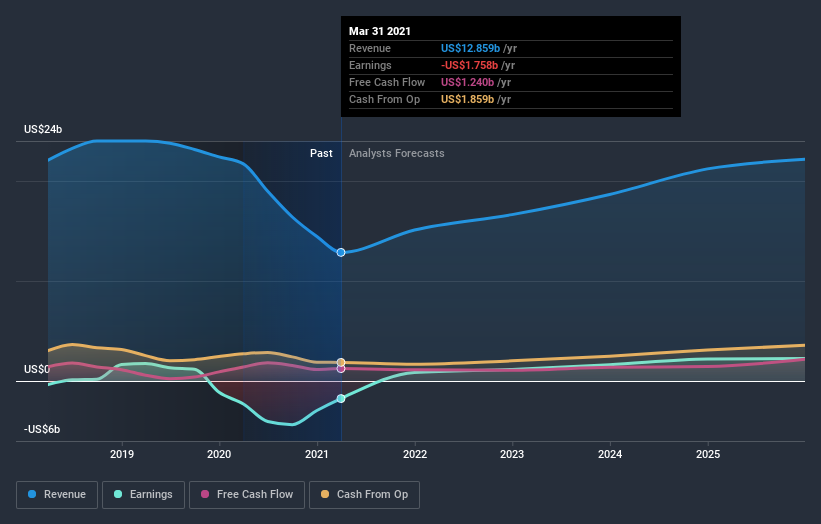Results: Halliburton Company Beat Earnings Expectations And Analysts Now Have New Forecasts
A week ago, Halliburton Company (NYSE:HAL) came out with a strong set of quarterly numbers that could potentially lead to a re-rate of the stock. Results were good overall, with revenues beating analyst predictions by 2.8% to hit US$3.5b. Statutory earnings per share (EPS) came in at US$0.19, some 9.9% above whatthe analysts had expected. Following the result, the analysts have updated their earnings model, and it would be good to know whether they think there's been a strong change in the company's prospects, or if it's business as usual. So we gathered the latest post-earnings forecasts to see what estimates suggest is in store for next year.
Check out our latest analysis for Halliburton
Taking into account the latest results, the current consensus from Halliburton's 24 analysts is for revenues of US$15.1b in 2021, which would reflect a notable 17% increase on its sales over the past 12 months. Earnings are expected to improve, with Halliburton forecast to report a statutory profit of US$0.99 per share. Yet prior to the latest earnings, the analysts had been anticipated revenues of US$14.3b and earnings per share (EPS) of US$0.91 in 2021. So there seems to have been a moderate uplift in sentiment following the latest results, given the upgrades to both revenue and earnings per share forecasts for next year.
Althoughthe analysts have upgraded their earnings estimates, there was no change to the consensus price target of US$22.48, suggesting that the forecast performance does not have a long term impact on the company's valuation. The consensus price target is just an average of individual analyst targets, so - it could be handy to see how wide the range of underlying estimates is. There are some variant perceptions on Halliburton, with the most bullish analyst valuing it at US$30.00 and the most bearish at US$13.00 per share. Note the wide gap in analyst price targets? This implies to us that there is a fairly broad range of possible scenarios for the underlying business.
Another way we can view these estimates is in the context of the bigger picture, such as how the forecasts stack up against past performance, and whether forecasts are more or less bullish relative to other companies in the industry. For example, we noticed that Halliburton's rate of growth is expected to accelerate meaningfully, with revenues forecast to exhibit 24% growth to the end of 2021 on an annualised basis. That is well above its historical decline of 0.2% a year over the past five years. By contrast, our data suggests that other companies (with analyst coverage) in the industry are forecast to see their revenue grow 6.4% per year. So it looks like Halliburton is expected to grow faster than its competitors, at least for a while.
The Bottom Line
The most important thing here is that the analysts upgraded their earnings per share estimates, suggesting that there has been a clear increase in optimism towards Halliburton following these results. Pleasantly, they also upgraded their revenue estimates, and their forecasts suggest the business is expected to grow faster than the wider industry. There was no real change to the consensus price target, suggesting that the intrinsic value of the business has not undergone any major changes with the latest estimates.
With that in mind, we wouldn't be too quick to come to a conclusion on Halliburton. Long-term earnings power is much more important than next year's profits. At Simply Wall St, we have a full range of analyst estimates for Halliburton going out to 2025, and you can see them free on our platform here..
Plus, you should also learn about the 1 warning sign we've spotted with Halliburton .
This article by Simply Wall St is general in nature. It does not constitute a recommendation to buy or sell any stock, and does not take account of your objectives, or your financial situation. We aim to bring you long-term focused analysis driven by fundamental data. Note that our analysis may not factor in the latest price-sensitive company announcements or qualitative material. Simply Wall St has no position in any stocks mentioned.
Have feedback on this article? Concerned about the content? Get in touch with us directly. Alternatively, email editorial-team (at) simplywallst.com.

